Don't Get Left in the Cold: Mastering Your Ductless HVAC Maintenance


Don't Get Left in the Cold: Mastering Your Ductless HVAC Maintenance
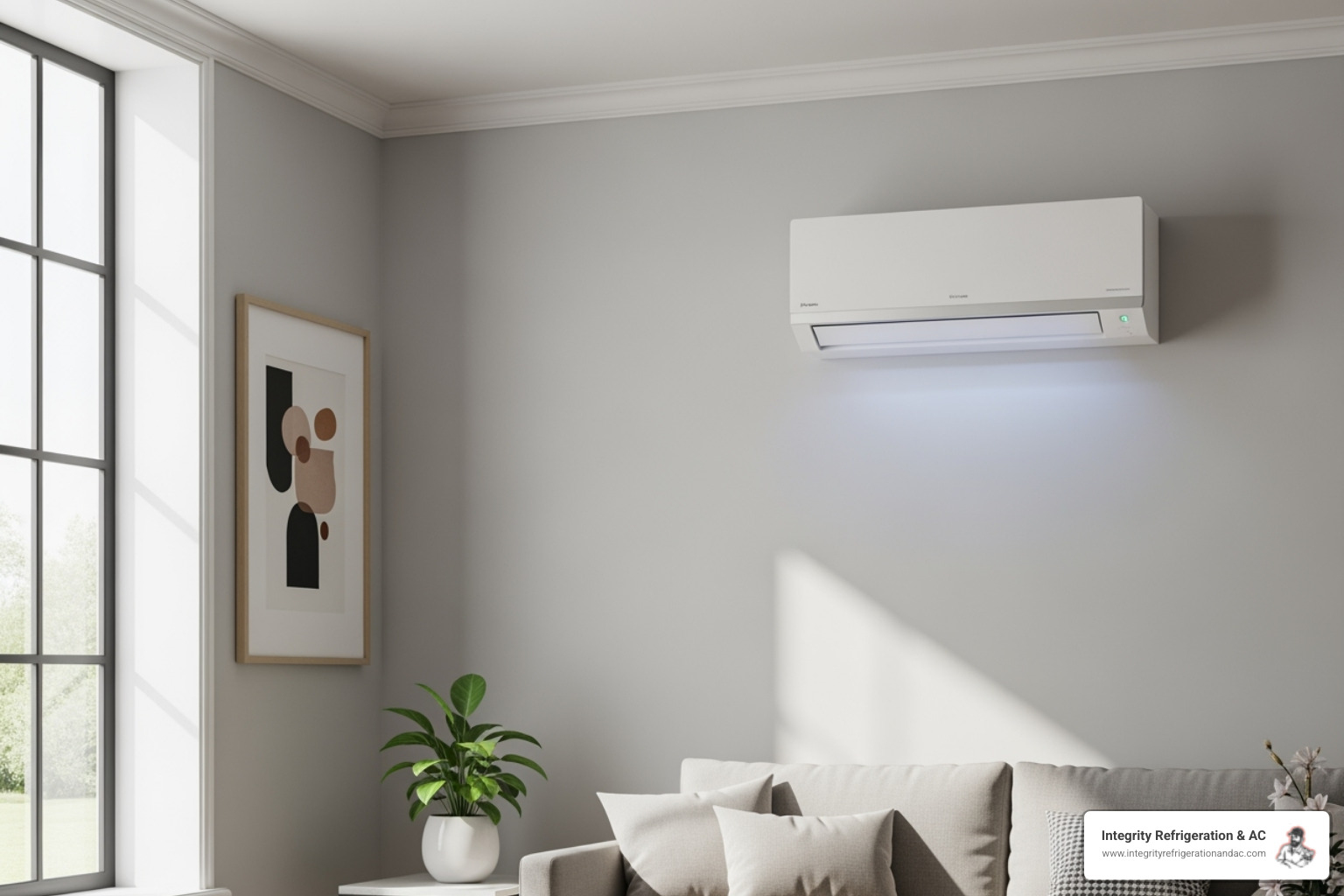
Why Ductless HVAC Maintenance Matters for Your Home Comfort
Ductless HVAC maintenance is key to keeping your mini-split system running efficiently, preventing costly breakdowns, and extending its lifespan. For Florida homeowners, these systems are a popular choice, offering zoned cooling and avoiding the energy loss common with traditional ductwork. According to the U.S. Department of Energy, leaky ducts can waste over 30% of your cooling energy.
To get the most out of your ductless system, regular upkeep is essential. Neglecting it can lead to poor performance, high energy bills, and expensive repairs. The good news is that many maintenance tasks are simple enough for homeowners to perform themselves.
Essential Maintenance Tasks:
- Monthly: Clean or replace air filters
- Quarterly: Clear debris from outdoor unit
- Biannually: Clean evaporator coils and inspect lines
- Annually: Schedule a professional tune-up
Key Benefits:
- Lower energy bills
- Better indoor air quality
- Extended system lifespan (15-20 years)
- Fewer emergency repairs
I'm Billy Gregus, owner of Integrity Refrigeration & A/C. For years, I've helped Polk County homeowners understand ductless HVAC maintenance to maximize their investment. This guide will empower you to keep your system running smoothly and know when to call for professional help.
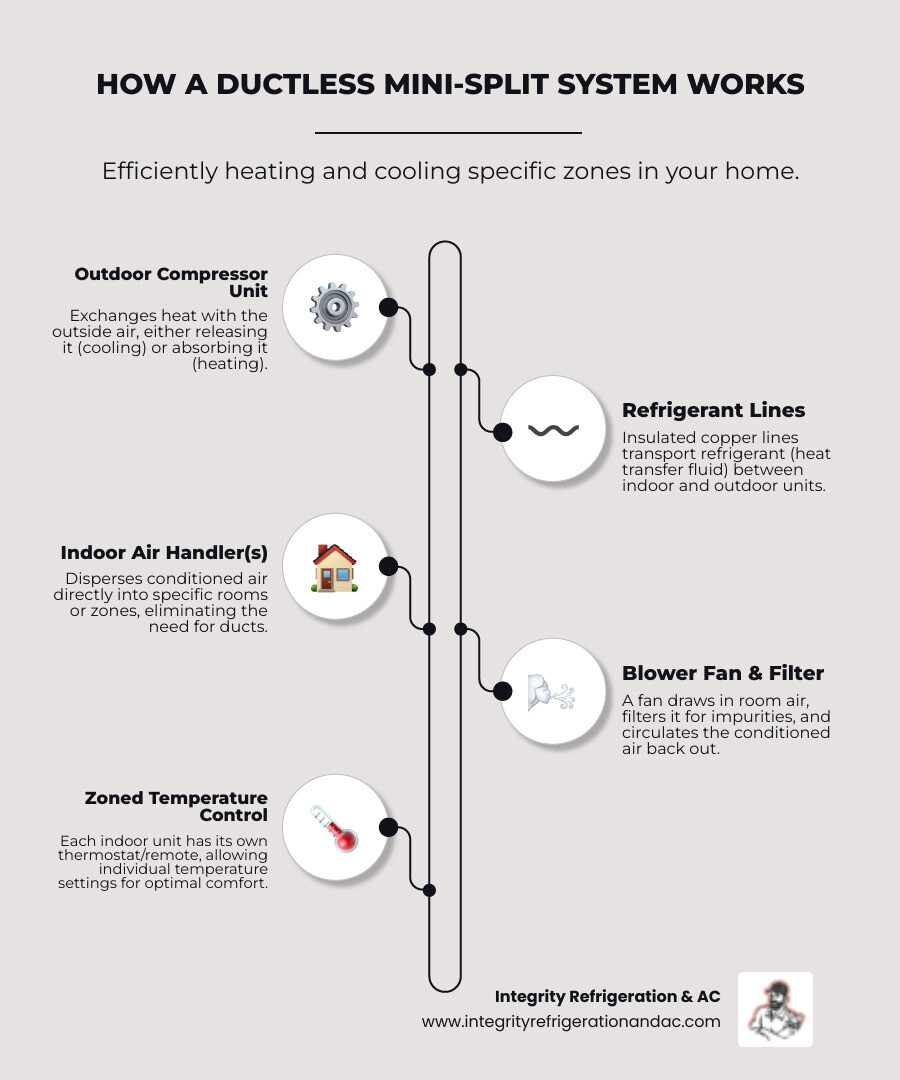
Why Regular Maintenance is Non-Negotiable
Think of your ductless mini-split like a car; you wouldn't skip oil changes and expect it to run smoothly. The same principle applies to your cooling system. Regular ductless HVAC maintenance is essential for keeping your home comfortable and your energy bills in check. Staying on top of maintenance provides lower energy bills, cleaner air, and a longer-lasting system, helping you avoid breakdowns during the summer heat. Neglecting it leads to poor performance, higher costs, and premature system failure.
Maximizing Energy Efficiency and Savings
Ductless systems are known for their energy efficiency, partly because they avoid the energy loss from leaky ductwork that affects central air systems. The U.S. Department of Energy notes this can waste over 30% of cooling energy. However, this efficiency depends on proper maintenance.
A system's SEER rating (Seasonal Energy Efficiency Ratio) indicates its efficiency, but clogged filters and dirty coils force it to work harder, consuming more electricity and raising your bills. Clean components allow for efficient heat transfer and free airflow, letting the system perform optimally. This is especially important for systems with inverter-driven compressors, which adjust their speed to save energy. A dirty system forces even these smart compressors to work harder than necessary, increasing wear and tear.
Improving Indoor Air Quality
Your ductless system also cleans the air, but only with regular maintenance. The air filters in your indoor units trap dust, pollen, and pet dander. When clogged, airflow is restricted, and trapped particles can be blown back into your home.
Additionally, the system removes humidity, which collects in a drain pan and flows out a drain line. If not cleaned, this area can become a breeding ground for mold and mildew, leading to musty odors and circulating mold spores. Even advanced multi-stage filtration systems are ineffective if they aren't maintained.
Extending Your Unit's Lifespan
A well-maintained ductless mini-split system can last 15 to 20 years. Neglect forces components like the compressor and fan motor to work harder, causing them to wear out prematurely. A compressor that should last 18 years might fail in 10 if it's constantly straining against dirty coils and restricted airflow.
Preventing premature component failure is the goal of maintenance. Simple tasks protect expensive parts from unnecessary stress. Regular maintenance is a small investment that protects you from the much larger cost of a full system replacement. Furthermore, many manufacturers require proof of annual professional maintenance to keep your warranty coverage valid. Skipping tune-ups could mean paying out-of-pocket for a repair that would have otherwise been covered.
The Homeowner's Guide to DIY Ductless HVAC Maintenance
While professional tune-ups are essential, you can perform many DIY ductless HVAC maintenance tasks to keep your system running smoothly. This regular care makes a real difference in performance and longevity.
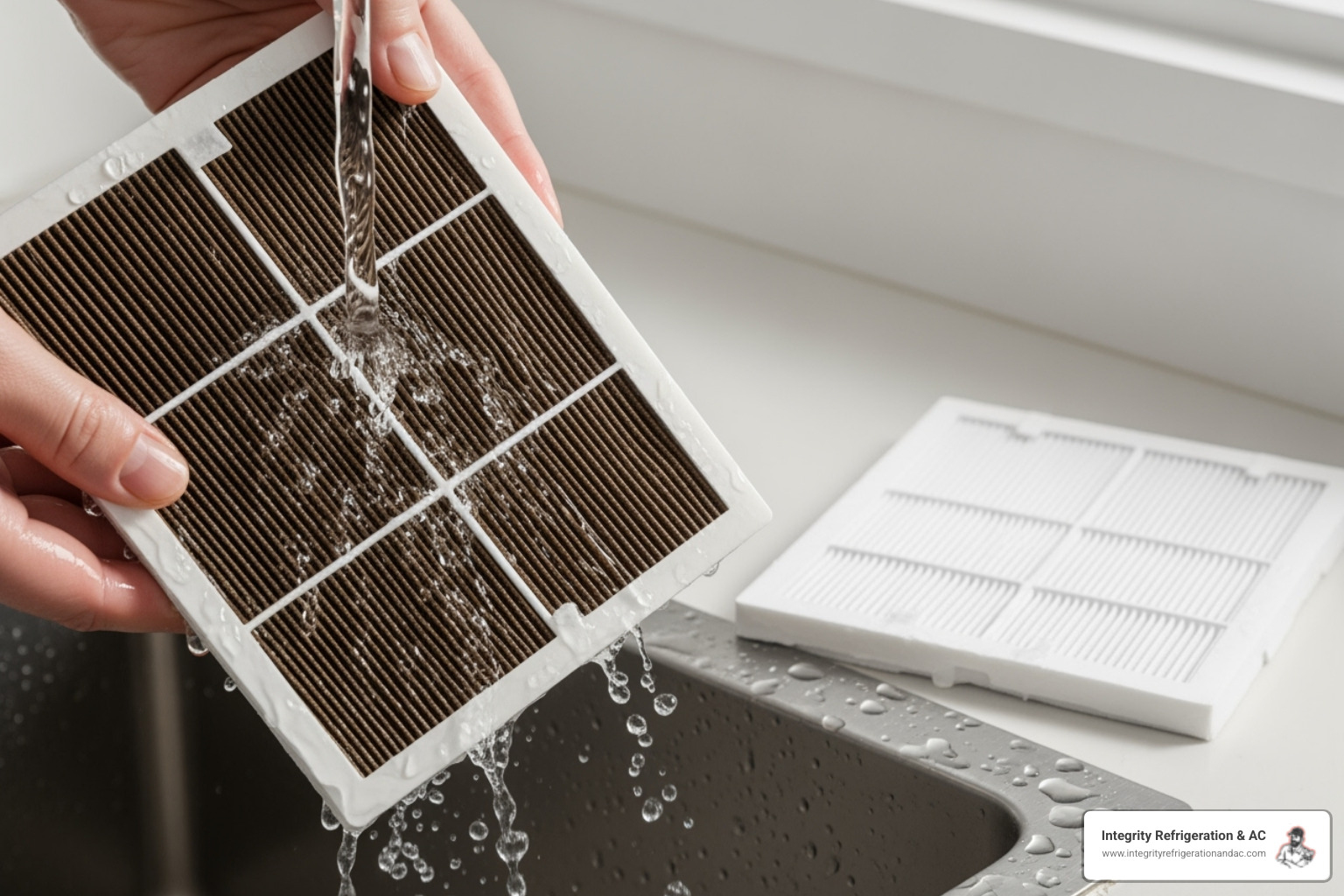
Before starting, always turn off the power to both the indoor and outdoor units at the circuit breaker for safety. Most routine tasks don't require special tools, just a basic understanding of what to do and when.
Essential DIY Ductless HVAC Maintenance for the Indoor Unit
Keeping your indoor unit clean directly impacts your comfort and air quality.
- Cleaning Air Filters: This is the most important task. Most units have reusable mesh filters that slide out easily. Check them monthly (more often with pets or allergies) and clean them every 1-3 months. To clean, turn off the power, remove the filters, and rinse them under cool water. Let them air dry completely before reinstalling. Dirty filters restrict airflow, reduce efficiency, and can cause the evaporator coil to freeze.
- Wiping Down the Unit: Use a dry microfiber cloth to wipe dust from the cabinet, vents, and louvers. For stubborn spots, use a lightly dampened cloth. A vacuum with a soft brush attachment can clean the vents. Never spray cleaners directly on the unit.
- Flushing the Condensate Drain Line: To prevent water leaks from clogs, flush the drain line every 3-6 months. Locate the small PVC pipe running from the indoor unit to the outside. Pour a quarter cup of distilled white vinegar into the opening, let it sit for 30 minutes, then flush with water. If you see water leaking from your unit, a clogged line is a likely cause.
Key Steps for Outdoor Unit Ductless HVAC Maintenance
Your outdoor unit needs regular attention to function correctly.
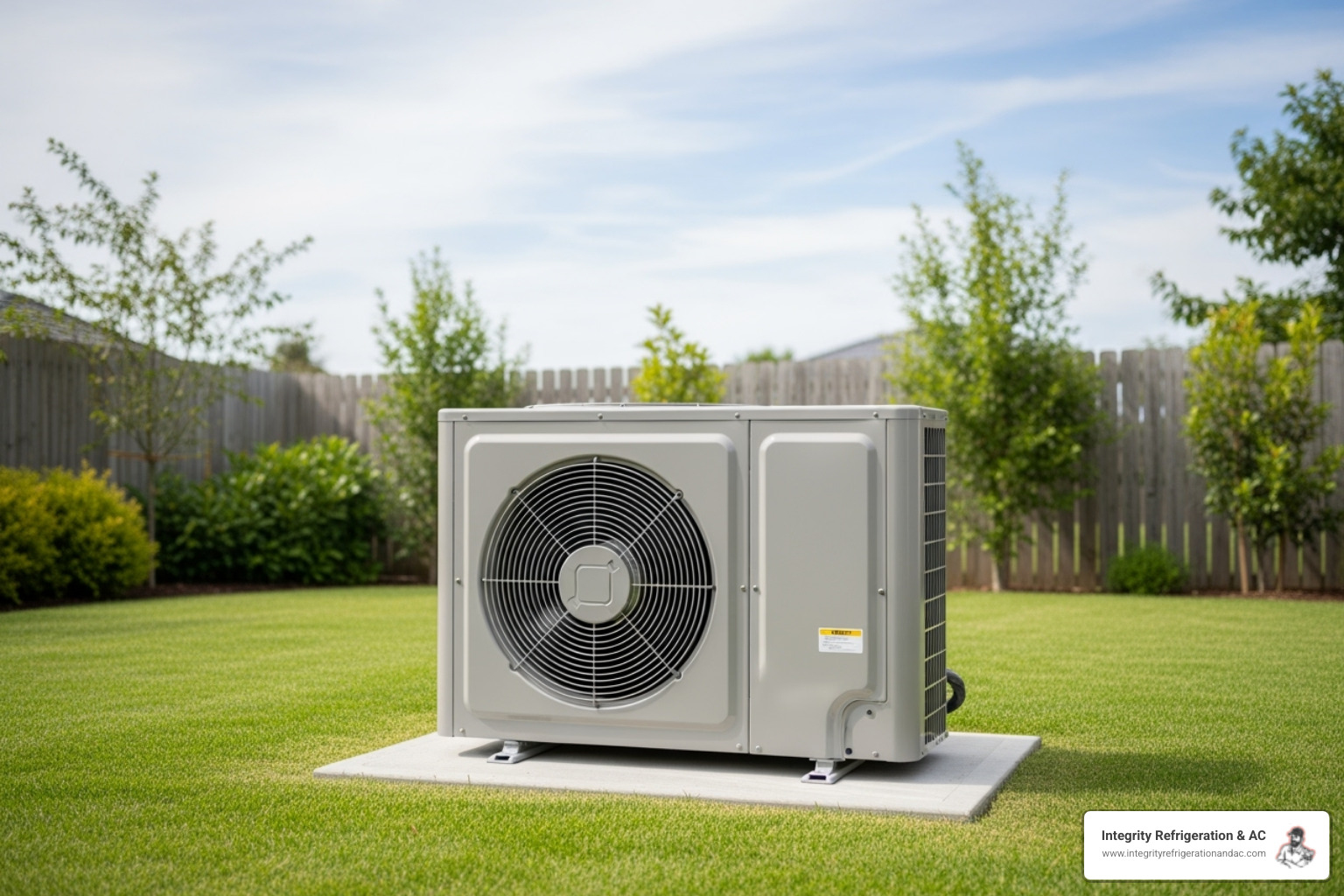
- Clearing Debris: Quarterly, turn off the power and remove leaves, twigs, and grass clippings from around the unit. Maintain at least 18 inches of clear space on all sides for proper airflow.
- Cleaning the Condenser Coil: Twice a year, after clearing debris, gently brush loose dirt from the coil fins. Then, use a garden hose (no high-pressure nozzle) to rinse the coil from top to bottom. This improves heat transfer efficiency.
- Straightening Coil Fins: If you notice bent fins, you can carefully straighten them with a fin comb from a hardware store. Be gentle to avoid puncturing the refrigerant lines.
- Inspecting Refrigerant Lines: Twice a year, check the insulated lines connecting the units for cracks or worn insulation. Damaged insulation reduces efficiency. If you suspect a leak (hissing sounds, ice buildup), call a professional immediately.
Troubleshooting Common Cooling Problems
- Insufficient Cooling: Check that the thermostat is on the correct setting and has fresh batteries. Also, ensure your air filters are clean.
- Ice Buildup: Ice on the coil or lines often indicates low refrigerant or an airflow problem. This requires a professional diagnosis.
- Unusual Noises or Odors: Rattling or buzzing could mean loose parts. A musty smell suggests mold. A burning smell indicates a potential electrical issue and requires immediate professional attention. These are warning signs that your system needs help.
The Professional's Touch: What an Expert Tune-Up Includes
While DIY care is important, professional expertise is invaluable for complex ductless HVAC maintenance. An annual professional tune-up is essential for peak performance. For ductless heat pumps that provide both cooling and heating, we recommend biannual service: once before the cooling season and once before the heating season. These checkups ensure your system is ready when you need it most.
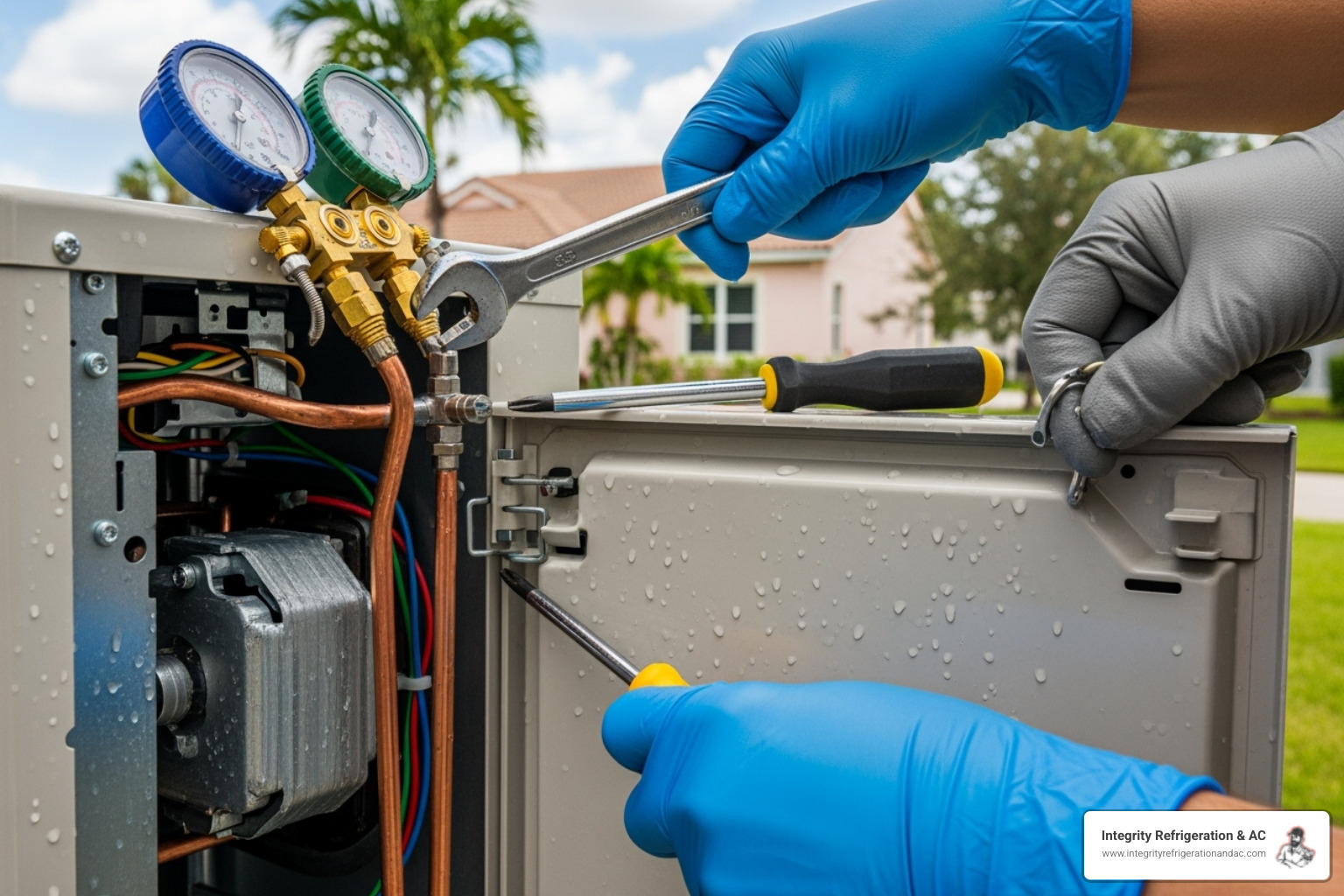
Beyond regular tune-ups, certain warning signs indicate it's time to call a professional, especially if DIY troubleshooting doesn't solve the issue.
What a Professional Technician Inspects
A trained technician uses specialized tools to perform a comprehensive inspection that covers your system's safety, efficiency, and longevity.
- Refrigerant Levels: Only a certified pro can check refrigerant levels. Low levels, usually from a leak, cause the system to struggle and can lead to ice buildup. A technician can accurately measure levels and repair leaks.
- Electrical Connections: Loose or corroded wiring can cause malfunctions and fire hazards. A technician will tighten all connections and check for wear.
- Capacitors and Motors: These components are vital for starting and running the system. A professional can test them and replace them before they fail, preventing an emergency breakdown.
- Deep Cleaning: Technicians can thoroughly clean the internal evaporator coil and blower wheel, which are hard to reach. They use professional-grade cleaners to remove buildup and can apply treatments to prevent mold growth.
- Thermostat Calibration: A technician ensures your thermostat is reading temperatures correctly and communicating properly with the system, preventing wasted energy.
- Condensate System: Professionals inspect and clean the entire drain line and pan, ensuring proper drainage and preventing water leaks.
- Overall Performance Evaluation: They check temperatures, airflow, and listen for unusual sounds to optimize performance and provide a complete picture of your system's health.
Signs Your Ductless System Needs Professional Repair
Knowing when to call for repair can prevent small issues from becoming major problems.
- Loud or Unusual Noises: Grinding, banging, or hissing sounds are not normal and indicate problems like worn bearings, loose parts, or a refrigerant leak.
- Water Leakage: While a simple clog might be a DIY fix, persistent leaks could mean a cracked drain pan or a frozen coil, requiring professional attention.
- Frequent Shut-Offs (Short Cycling): If your system turns on and off every few minutes, it could be due to low refrigerant or a failing compressor. This puts immense strain on the system.
- Ice Buildup: Ice on coils or lines is never normal and is often a symptom of low refrigerant or restricted airflow that needs a professional diagnosis.
- Ineffective Cooling or Heating: If you've cleaned the filters and checked the thermostat with no improvement, it's time for a professional to diagnose the root cause.
- Foul Odors: A musty smell may indicate mold, while a burning smell could signal a serious electrical problem that requires immediate attention.
- Error Codes: If your unit displays an error code, write it down and call a professional. It helps them diagnose the problem quickly.
At Integrity Refrigeration & AC, we know that regular professional maintenance and homeowner care are the keys to a long-lasting system. Our flexible financing options make sure necessary repairs are always accessible.
Ductless vs. Central Air: Understanding the Maintenance Difference
If you've owned a central air system, you may wonder how ductless HVAC maintenance compares. In many ways, maintaining a ductless system is simpler because it lacks ductwork. This eliminates the need for duct cleaning and sealing, which prevents the energy loss and air quality issues associated with leaky ducts.
While ductless systems require more frequent filter cleaning (monthly to quarterly for each indoor unit), the filters are easily accessible on the wall-mounted units. A central air system has one filter that's changed less often but is typically located in a harder-to-reach attic or closet. The maintenance for outdoor units is nearly identical for both system types.
| Feature | Ductless AC Maintenance | Traditional Central Air Maintenance |
|---|---|---|
| Ductwork | None to clean or seal (a major advantage!) | Requires periodic duct cleaning, inspection, and sealing to prevent energy loss and air quality issues |
| Filter Cleaning | Indoor unit filters cleaned/replaced frequently (monthly to quarterly) | Central furnace/air handler filter replaced less frequently (1-3 months) |
| Indoor Units | Multiple individual indoor units, each requiring separate filter and coil cleaning | One central air handler with one filter |
| Outdoor Unit | Condenser unit requires clearing debris, coil cleaning, fin straightening | Condenser unit requires clearing debris, coil cleaning, fin straightening |
| Condensate Drain | Individual drain lines for each indoor unit to check and flush | Single condensate drain pan and line for central system |
| Professional Service | Annual (or biannual for heat pumps) for refrigerant, electrical, coil cleaning | Annual (or biannual for heat pumps) for refrigerant, electrical, coil cleaning |
| Accessibility | Indoor units are easily accessible for DIY cleaning | Air handler often in attic/closet; ductwork can be hard to access |
Key Maintenance Differences
The main difference is the absence of ductwork, saving you from the cost and hassle of duct cleaning and sealing. While you maintain several smaller indoor units instead of one large one, their accessibility of components makes DIY tasks much easier. You can clean a filter in one room without shutting down the entire system, and you won't have to crawl into tight spaces.
Considerations for Ductless Heat Pumps and Smart Features
If your ductless system is a heat pump that provides year-round heating and cooling, we recommend twice-a-year professional maintenance—once in the spring and once in the fall. This ensures both the heating and cooling cycles are working efficiently.
For systems with smart features, ensure your Wi-Fi connection is stable and check for occasional system software updates to keep everything running smoothly. Many smart systems also send maintenance alerts, which helps you stay on schedule.
Frequently Asked Questions about Ductless AC Maintenance
Homeowners often have questions about their mini-split systems. Here are answers to some of the most common concerns we hear at Integrity Refrigeration & AC.
How often should a ductless system be professionally serviced?
We recommend professional ductless HVAC maintenance at least once a year. This annual checkup allows a technician to catch small issues before they become expensive repairs. If your system is a heat pump that you use for both cooling and heating, we suggest scheduling service twice a year: once in the spring before the cooling season and again in the fall before you need heat. These pre-season tune-ups prevent breakdowns and ensure your system is ready for peak demand.
Can I clean the ductless AC coils myself?
It depends on the coil. You can clean the outdoor condenser coil yourself by gently rinsing it with a garden hose (avoid high pressure) after clearing away debris. This is a great DIY task to improve efficiency.
However, the indoor evaporator coil should be cleaned by a professional. It's located deep inside the unit, and its fins are very delicate. A professional has the right tools and specialized cleaning solutions to clean it thoroughly without causing damage, such as a refrigerant leak. They can also apply treatments to prevent mold growth.
What happens if I don't clean my mini-split filter?
Neglecting your mini-split filter is one of the fastest ways to cause problems. Here's what happens:
- Reduced Airflow and Efficiency: A clogged filter forces your system to work harder to push air through, leading to higher energy bills and less comfort.
- Poor Indoor Air Quality: The filter stops trapping dust, pollen, and other allergens, which then get circulated back into your home. This can be a problem for anyone with allergies or respiratory issues.
- System Damage: Severely restricted airflow can cause the indoor coil to freeze. When the ice melts, it can lead to water leaks and damage to your home. This strain also shortens the lifespan of critical components like the compressor.
Cleaning your filter is a simple, five-minute task that protects your investment. Check it monthly and clean it whenever it looks dusty.
If you're ever unsure about any aspect of ductless HVAC maintenance, our team at Integrity Refrigeration & AC is here to help.
Conclusion
Proper ductless HVAC maintenance is a smart investment in your home's comfort and your system's longevity. As we've covered, a combination of simple DIY tasks and annual professional service is the key to keeping your ductless system running efficiently.
Regularly cleaning filters, clearing debris, and wiping down units are foundational steps that save you money and prevent breakdowns. However, tasks like checking refrigerant levels, inspecting electrical connections, and deep cleaning internal coils require the expertise of a trained technician. Annual (or biannual for heat pumps) professional tune-ups catch issues before they become costly problems.
Here in Winter Haven and Polk County, Florida's heat is relentless, and your comfort system needs to be reliable. At Integrity Refrigeration & AC, we are dedicated to keeping your home comfortable year-round. We offer flexible financing options to ensure that professional maintenance and repairs are always accessible and stress-free.
Don't wait for a breakdown during a Florida summer. Proactive care is always the best approach. If you're ready to schedule a tune-up or need expert help with your system, reach out to our team for comprehensive Ductless AC Services in Winter Haven, FL. Let us help you keep your home comfortable, your air clean, and your system running strong.


